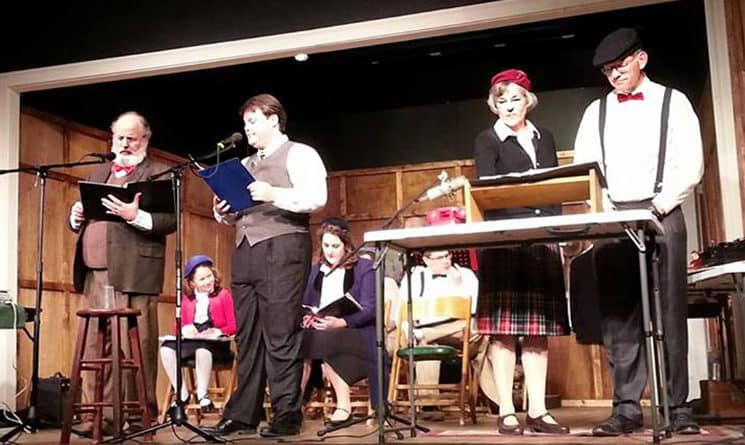The Garrison Players in Rollinsford want audiences to do a little work for their Halloween thrills this year. The theater is staging live performances of two 1940s radio dramas, “Sorry, Wrong Number” and “The Hitch-Hiker,” complete with period costumes and old-fashioned sound effects. Maybe that sound you hear is only someone clapping together a pair of wooden blocks — or maybe it’s actually the sound of footsteps getting closer to you by the second.
“It requires some mental work. You hear everything and your mind has to put it together,” says actor Bill Burr. “It’s an old art. There’s some nostalgia there, but it’s evocative rather than prepackaged.”
Burr and other Garrison Players performers will stage live performances of the two dramas this month, beginning on Friday, Oct. 16. “Sorry, Wrong Number” was written by Lucille Fletcher and was originally performed in 1943. The story of a bedridden woman who accidentally overhears a murder plot on a crossed telephone connection, it was adapted as a film in 1948. Fletcher also wrote “The Hitch-Hiker,” about a man on a cross-country trip who sees a phantasmal hitchhiker everywhere he goes, which was originally performed by Orson Welles in 1941.
This is Garrison Players’ third year of staging a live radio play, according to the show’s director, Judi Currie. For the first two years, the theater produced Christmas-themed radio plays — “It’s A Wonderful Life” and “Miracle on 34th Street” — but this year, Currie said, a Halloween-themed radio drama was a better fit.
“We chose ‘Sorry, Wrong Number’ and ‘The Hitch-Hiker’ because they’re both spooky, and because both were originally done as radio dramas,” she says.
And, because they’re performing it live on stage, the actors and Foley artists will be dressed in period costumes from the 1940s, a heyday for radio dramas.
“It’s a very different world than the one we live in, where we’re connected to everything. This is just you using your hearing, and that’s it. — director Judi Currie
Currie is a radio theater veteran. She was part of the New Hampshire Radio Theater group, which performed live radio dramas in the Manchester and Concord area for about 10 years. The group disbanded in 1996. Much of the fun in staging a radio drama comes from figuring out how to make sound effects live on stage.
“Everyone says, ‘Oh, just get (sounds) off the internet,” Currie says. But that’s boring — why watch someone on stage push a button when, for example, you can see them use a small container of Rice Crispies to make the soft crunching sound of someone walking on snow?
That’s been the challenge for Shaune McCarthy, the Foley captain for the production. She’s in charge of collecting sounds for the performance, and that means replicating an array of noises — rotary phones, or the sound of coins being dropped in a payphone — that will sound familiar to older audience members.
“You just have to use your imagination and go digging around for these sounds,” McCarthy says.
Live radio dramas are easy to stage in many ways, according to Currie. Performers read from a script, so they don’t need to memorize lines, and there’s no set, which means no one has to move around on stage, either. But the performance presents other challenges. For example, the actors are reading the script directly into a microphone. They’re not interacting with other actors on stage and they’re not using their bodies to help show action.
“They have to tell the whole story with their voice, and the audience doesn’t have the benefit of (seeing) the companion action,” she says.
Burr, an actor in “The Hitch-Hiker,” says the performances are a “meta experience” that can be challenging to pull off in front of an audience.
“I’m an actor playing a voice actor playing someone who’s telling a story,” he says.
Radio drama casts are also small. A few actors may end up taking on multiple roles.
“You can’t sound like the same person over and over again,” Currie says. “So we’ve got one girl who’s doing a Southern accent (in ‘Sorry, Wrong Number’), and later, she’s one of the (telephone) operators, with a very New York voice.”
Radio dramas persist because “it’s a little bit of a purer form of storytelling,” Currie says. There’s a reason broadcasters used to call radio “the theater of the imagination,” according to Currie.
“It’s a very different world than the one we live in, where we’re connected to everything. This is just you using your hearing, and that’s it,” she says.
The dramas are only as good as the scripts, and because of radio’s limitations, Currie thinks the writing was stronger and that the actors and Foley artists were able to do more with less.
“You had to tell the story in a way that doesn’t rely on any other props or anything. Now, you can have a musical in a Boston theater and it can have a big, lavish set and special effects, and it doesn’t have to have much of a plot. You can take 10 popular songs and string them together with a little dialog and call it a musical,” she says.
Live radio plays of “Sorry, Wrong Number” and “The Hitchhiker” will be performed Oct. 16-24 at the Garrison Players Arts Center, 650 Portland Ave. (corner of Route 4 and Roberts Road) in Rollinsford. Shows are Fridays and Saturdays at 8 p.m. and Sundays at 3 p.m. Tickets are $18, available at 603-750-4278 or garrisonplayers.org.

